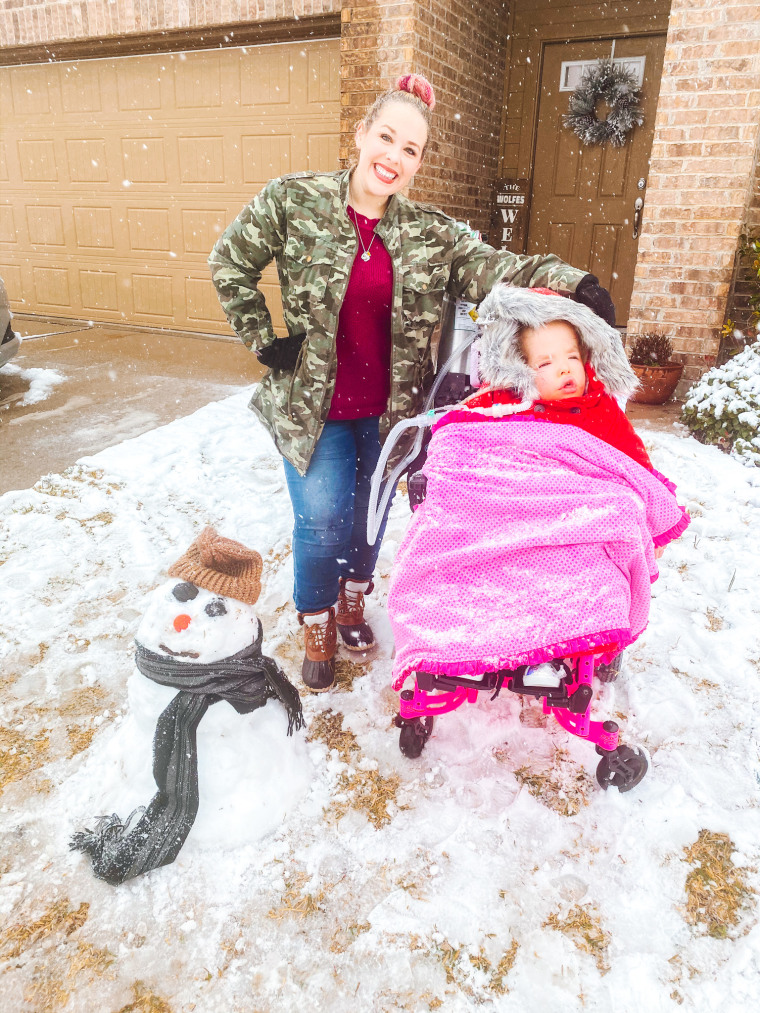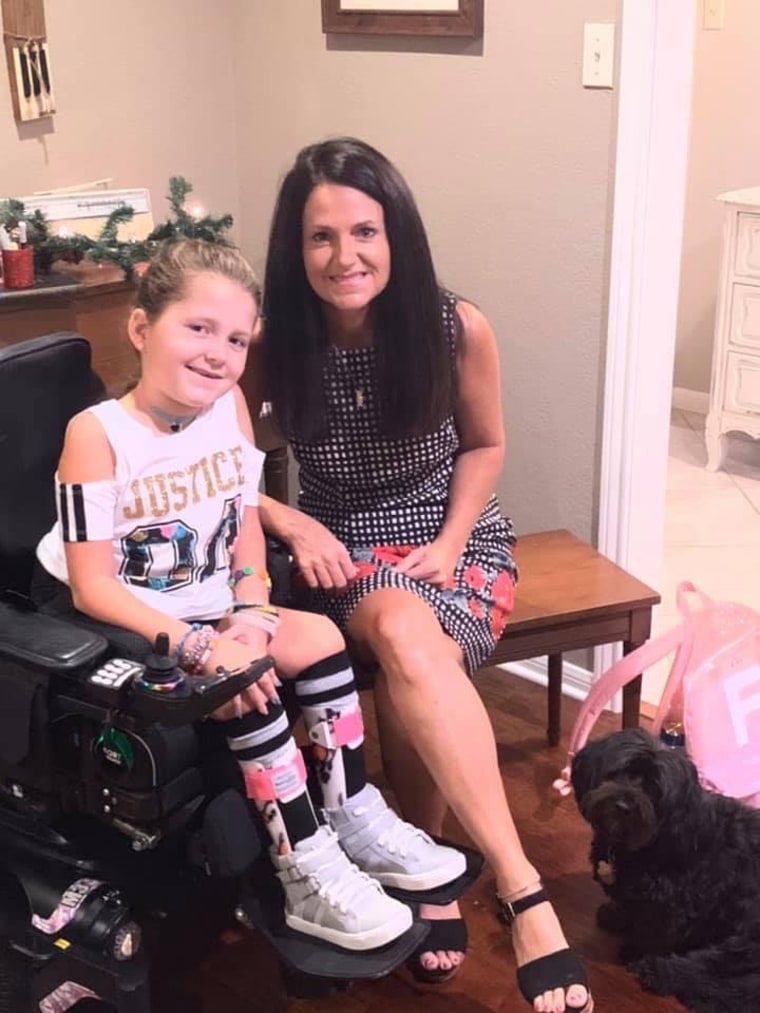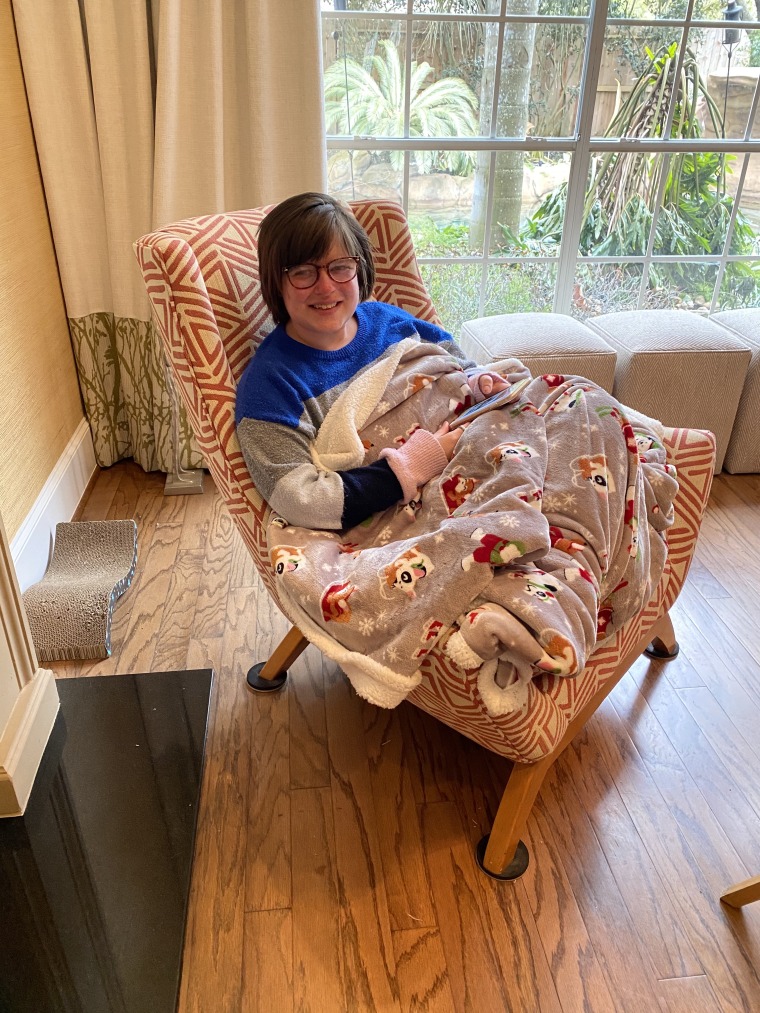When extreme winter weather caused a power outage at Stephanie Wolfe's Texas home, the mom acted fast: She immediately hooked her 6-year-old daughter's ventilator and oxygen concentrator up to the family's generator. The generator wasn't powerful enough to keep their home warm, but it operated the machinery that allowed her daughter to breathe.
As freezing temperatures began to set in, Wolfe, her husband and their two children relocated to her in-laws' house. Their accessible van wasn't able to manage the icy roads, so they left her daughter's wheelchair behind and brought the generator in the family's more weather-appropriate truck. Wolfe's in-laws didn't have power either, but they had a gas-powered fireplace, so at least everyone could stay warm.
Then, at 4 in the morning on Monday, the generator ran out of gas.

"That moment was sheer terror," Wolfe told TODAY Parents. "You can't ration oxygen. ... (A lack of oxygen) can cause brain damage. It was just straight panic."
Wolfe is among thousands of parents and families of medically fragile children who lost access to critical care as winter weather battered Texas and other parts of the country. The state's power grid was down for days, leaving millions in the dark and putting families like Wolfe's at particular risk. Icy roads and sleeting conditions only made things more complicated.
Power outages affect at-home care
Like Wolfe, Hazel Canela needs power to operate her son's gastrostomy-jejunostomy tube. Her son, 11, was diagnosed with an extremely rare genetic disease known as CHAMP1, which affects neurological function and development. One effect of the disease is instances of cyclic vomiting; because of that, Canela's son needs a tube for feeding and hydration. The vomiting usually can be kept in check with medication, but Canela's son had a terrifying bout on Sunday afternoon.

"He never stopped vomiting Sunday afternoon, through the night, and it was already a freeze," Canela said. "I knew I had to take him to the hospital, and I was preparing and I looked outside and it was already pouring sleet. ... I was like, 'I can't drive, I don't know how to drive in this.'"
Canela, an intensive care unit nurse, decided it would be safer to stay home, but at 2 a.m. on Monday, the power went out.
"The only lifeline we had at that time was that feeding tube," said Canela, whose husband, a respiratory therapist, was away at work at the time. "If he continued throwing up with no hydration, he would have ended up in hypovolemic shock."
Such shock can deprive the body's organs of enough blood or oxygen and lead to organ failure. Canela said that she and her family been expecting rolling blackouts, but the lights didn't come back on for days.
"I was scared to death," Canela said. "At that point, I was no longer a mom and a nurse. I was just wearing my mom hat. I was scared ... (and) nothing scares me. I work in the ICU. But of all the calamities, I think this was the worst."
Canela was considering another drive to the hospital when nearby family members delivered a generator. While those family members would spend the rest of the blackout without emergency power, Canela's son managed to stay out of the hospital.
But having access to a generator isn't always a cure-all — when Wolfe's generator ran out of gasoline, her family found it incredibly difficult to get the fuel necessary to turn it back on.
"It took several hours," Wolfe recalled. "It just ended up being so stressful ... especially with the road conditions so bad."
Icy conditions trap families at home
Wolfe said that after she and her husband realized that keeping the generator running wasn't a "sustainable" option, they were able to get to a friend's house, where there was power. However, even driving that short distance put them at risk.
"There was ice all over the road, and we were fishtailing even in our truck," Wolfe said, calling the conditions "super dangerous." She added that since her daughter's wheelchair had been left at home, she "lost a lot of her accessibility" and had to be carried.
Leeann Woodall Fortenberry, a single mom whose daughter has spinal muscular atrophy, said she didn't lose power during the storm, but worried about what would happen if she needed to leave the house with her daughter, who uses a ventilator at times and is "dependent on a lot of things" for lung function. Her daughter also uses a wheelchair.

"We can't get out of our house," Fortenberry said. "The driveway and the sidewalks are frozen, and you can't put a 400-pound power chair on that ice. I'm like, if there's a fire, how could we get out of the house? ... We live on a hill, so I wouldn't have been able to get out of my driveway, and no one could come get us because in our neighborhood, even (as it gets warmer) the roads are impassible."
Canela said she also worried about response times from emergency services if her family had not been able to access a generator. And, on top of everything else, the parents said they were concerned about contracting COVID-19.
Parents confront unexpected challenges
Mary Jane Mudd, a mother of three in Houston, said her family lost power for the majority of the week. Her daughter, 28, has tuberous sclerosis complex, which results in benign tumors in vital organs. She also has autism. Even though her daughter wasn't reliant on life-saving equipment, Mudd said she had a difficult time getting her to understand what was going on.
"She's very much like a 5-year-old ... and we were freezing, just like everybody else in Texas," Mudd explained. "It was scary, and it was challenging, trying to help her comprehend what was happening."

During the power outages, Mudd and her family slept in front of a fireplace in their living room, but on Wednesday night, her daughter refused to stay with them, insisting on sleeping separately in her bedroom.
"She just refused. I was like, 'Sleep with us and we'll all stay warm,' and she goes, 'No, I go (to) my own bed,'" Mudd recalled, noting that it was extremely cold in her daughter's room. "I kept wrapping her up and checking all night. It was just a really scary situation."
Concerns loom for the weeks ahead
Fortenberry said that even now, she's worried about what the next few days or weeks will look like for herself and her daughter.
"We've been scared to death," she said. "There's a lot of things that she gets, like filters and nebulizers, and so I worry that some of those supplies are going to be backed up. We haven't had mail in days, and of course haven't seen any UPS or FedEx trucks. Everything's backed up."
Wolfe said that getting just simple supplies like groceries has been a "nightmare." In recent days, pictures of bare shelves at major food stores have gone viral on social media.
It's not just a matter of food and medical supplies: There are still concerns about power outages, and many parts of the state are under boil water advisories, which continues to complicate home life. Fortenberry said she has kept her faucets dripping to prevent the pipes from freezing over, which will likely result in a major water bill.
"The main thing I'm worried about now is the expenses we'll face," she said.


